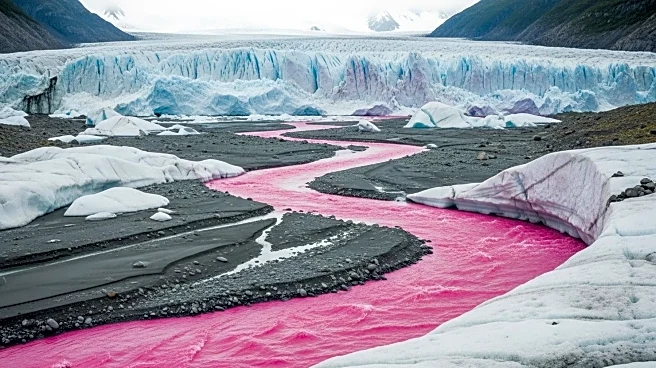What's Happening?
Researchers from the Swiss Federal Institute of Technology in Zurich have dyed the meltwater of the Rhône glacier pink to better monitor its flow rate. This initiative is part of a broader effort to study the glacier, which has lost approximately 60% of its volume since 1850. The Rhône glacier, like many alpine glaciers, is under threat from rising global temperatures. The pink dye serves as a visual aid, allowing researchers to track the movement and speed of the meltwater more effectively. This method is intended to provide more accurate data on how quickly the glacier is melting, which is crucial for understanding the impacts of climate change on these vital natural resources.
Why It's Important?
The melting of glaciers is a significant indicator of climate change, with implications for global sea levels and freshwater supplies. The Rhône glacier's reduction in volume highlights the urgent need for climate action. By using dye to track meltwater, researchers can gather precise data on the glacier's melting patterns, which can inform climate models and policy decisions. This research is critical for predicting future changes in water availability and for developing strategies to mitigate the effects of climate change. The findings could influence environmental policies and conservation efforts aimed at preserving glaciers and managing water resources more sustainably.
What's Next?
The data collected from this study will likely contribute to ongoing climate research and may prompt further investigations into other glaciers experiencing similar conditions. Researchers may expand this method to other regions to gather comparative data. The results could also lead to increased advocacy for climate action and influence international climate agreements. As the study progresses, it may attract attention from environmental organizations and policymakers, potentially leading to new initiatives aimed at reducing greenhouse gas emissions and protecting vulnerable ecosystems.
Beyond the Headlines
This research underscores the broader ethical and environmental challenges posed by climate change. The loss of glaciers not only affects local ecosystems but also has far-reaching consequences for global weather patterns and sea levels. The study highlights the need for innovative approaches to environmental monitoring and the importance of international collaboration in addressing climate issues. It also raises questions about the responsibility of industrialized nations in contributing to and mitigating climate change.










